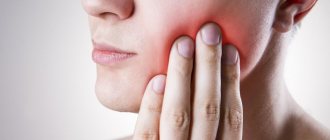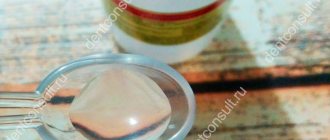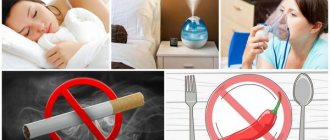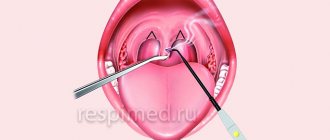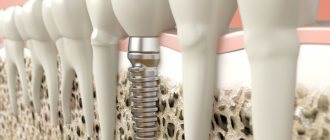The palate is a natural partition separating the mouth from the nasopharynx. It provides an important anatomical function - it is involved in chewing food, pronouncing sounds, and is also responsible for articulation. Therefore, the appearance of any uncomfortable and painful sensations brings serious problems for a person that interfere with leading a normal lifestyle.
Soreness in the palate of the mouth can indicate a wide range of problems: from the presence of external irritants that cause mechanical damage to the mucous membrane, to infectious diseases and functional disorders.
If a person has pain in the roof of his mouth, there can be many reasons. Therefore, the best way to find and eliminate them is not self-diagnosis, but contacting specialized specialists.
What is the palate and where is it located in the oral cavity?
As mentioned above, this is a horizontally located partition that separates the oral cavity from the nasal cavity. Approximately 2/3 of its surface suggests the presence of a bone base. These are solid processes in the form of plates that have a concave shape and are located in a horizontal position on the upper jaw. They are covered by a thin mucous membrane, which turns into the velum palatine. This is already a muscular formation with a fibrous membrane, also covered with mucous membrane.
The upper palate is the wall located in the mouth from above in the horizontal plane
It is the soft part that represents the barrier between the mouth and pharynx, and on its far edge there is the uvula. The palate is directly involved in the process of chewing food and swallowing, helps in the reproduction of sounds, which makes it an important component of the articulatory apparatus.
Anatomy of the palate
The palate, located above, has two cavities - the oral and nasal. It includes two components - the hard and soft palate. The appearance of the upper palate resembles a dome.
There is a hard part of bone in front. The components are plate-shaped processes of the bone tissue of the upper jaw. From below, the palate is enveloped in mucous tissue, which in turn passes into the soft tissue of the palate, the so-called velum palatine. The location is very close to the tonsils, above the root of the tongue.
The soft palate is formed from muscles connected by connective tissue and mucous membrane. The cavity located behind the nose is divided into 2 entrances: into the laryngeal region and into the pharynx. The second entrance provides access to the trachea and esophagus.
Important ! With inflammation, pain affects both parts of the palate.
Discomfort is observed when speaking, swallowing food, and even at rest. For a person, these sensations are quite unpleasant. Where to go in such a situation? The first step is to consult a dentist. At the initial stage, he will determine the cause of the pain and refer you to the right specialist, or, if the case relates to his medical practice, prescribe the necessary treatment.
Video - More about the palate
Causes and symptoms of inflammation
At the initial stage of the pathological process, primary inflammation is diagnosed. First, blood circulation in the tissues is disrupted, and the person begins to experience moderate discomfort or even pain, which is especially noticeable when touching the palate with the tongue. Slight swelling appears. When the problem enters the stage of secondary inflammation, the pathological process takes over more space, and the pain noticeably intensifies. When the upper palate hurts, there can be a variety of reasons. Let us consider the main prerequisites in more detail.
Infections in the mouth
Infections of a bacterial and fungal nature (candidiasis) can provoke inflammatory processes, including on the mucous membrane of the palate. With this clinical picture, a whitish coating usually appears, painful ulcers, red areas and swelling may appear. If the problem is not addressed in time, the burning and pain will intensify, which will subsequently create serious difficulties in chewing food and swallowing.
The photo shows candidiasis in the mouth
Mechanical, thermal and chemical injuries to the mucous membrane
The palate is easily scratched by hard foods, such as seed shells or crackers. The problem may also be the appearance of a thermal or chemical burn after eating too hot food/drinks or sour, salty, spicy foods. Such microtraumas in conditions of insufficient hygiene become a favorable aid for the formation of pathogenic microflora and infection of tissues. The result will be redness and soreness. The mucous membrane usually swells, ulcers and blisters appear.
Dental diseases
Pathologies such as caries, pulpitis and stomatitis can also lead to the appearance of painful ulcers on the palate and along the entire perimeter of the mucous membrane. The inflammatory process often spreads to the surrounding soft tissues, including the palate and tongue, causing corresponding complications. A similar clinical picture also occurs with severe periodontitis or periodontal disease.
Another possible problem is leukoplakia, the development of which is accompanied by the formation of compactions in the mucous membrane and the appearance of dense whitish plaques, which can also be localized in the palate. The cause of this pathological phenomenon may be trauma, frequent rough mechanical impact on the mucous membrane, excessive smoking and consumption of low-quality alcohol.
The photo shows leukoplakia
Other Possible Prerequisites
In some cases, symptoms of inflammation appear after the installation of metal crowns or braces. Here, the appearance of redness, itching, and swelling can be provoked by the influence of galvanic currents and a corresponding change in the natural environment in the oral cavity. The reason why the soft palate in the mouth hurts may be associated with infectious diseases of the ENT organs.
It should also be noted that adult heavy smokers and those who abuse low-quality alcohol are especially susceptible to frequent dental problems. It also happens that inflammation of the palate is caused by disturbances in the functioning of the submandibular, sublingual and minor salivary glands. Sometimes, as a result of such disorders, various neoplasms arise in the oral cavity - from small benign to serious malignant tumors, including fibromas, papillomas, lymphangiomas and other painful phenomena. In any case, if you suspect a problem, you should definitely contact a specialist.
Diseases of the ENT organs can cause this symptom
Reasons for the development of the inflammatory process
Inflammation of the palate near the tooth can occur:
- due to mechanical damage when eating crackers, seeds, nuts and other solid foods,
- thermal burn,
- some diseases - candidiasis, stomatitis,
- frequent smoking,
- pathologies of the jaw joints,
- inaccurate tooth extraction, violation of the rules for installing a microprosthesis.
Inflammation can develop under the influence of one or more factors. The problem cannot be ignored, as this can lead to blood poisoning, problems with breathing and swallowing.
The nature of the pain and the need to contact a specialist
If the roof of your mouth hurts, the nature of the course of this symptom usually depends on the cause that led to the inflammatory process. To understand what exactly caused this reaction, you will have to seek medical help. If this is simple damage from rough food, the wound may swell for several days, but the sensations will be tolerable, and the discomfort should gradually subside.
To speed up the healing process, experts recommend being careful when eating and rinsing your mouth with a light antiseptic solution or a soothing herbal infusion. You should consult your doctor personally about suitable medications for symptomatic therapy.
If the pain does not go away within 3-4 days and only gets worse, you should definitely visit a dentist. If the situation is ambiguous, the specialist will suggest undergoing a diagnostic examination. To determine the cause of the pathological process, you may have to undergo x-ray diagnostics, as well as visit other specialized doctors, for example, an ENT specialist, an infectious disease specialist, a therapist or an oncologist.
Stomatitis and pediatrics
It is quite difficult to treat stomatitis in representatives of the younger generation. It is very difficult to force them to rinse their mouths, and even more difficult to treat them with medicine. However, patience and affection will allow you to succeed.
Important ! A child with this problem often develops a fever.
With fungal stomatitis, not only ulcers appear, but also a coating reminiscent of curdled milk. During herpes, the ulcers can spread beyond the mouth, now also around it.
In children, stomatitis and other oral pathologies are more difficult to treat
Infants often develop fungal stomatitis, which causes them to be capricious and refuse to eat. Whitish spots on the tongue, reminiscent of curdled milk, can be noticed simply by looking into the baby's mouth. Among the most well-known methods of treating fungal stomatitis is wiping the mouth with a soda solution. To prepare this remedy, you need 1 tsp. Stir soda in a glass of boiled water, wrap gauze around your finger, soak it in the solution, and then wipe the inside of the baby’s mouth.
If the pathology is at the initial stage of development, honey will be useful. They should lubricate ulcers and affected areas of the mucous membrane. But this is only permissible if the baby is not allergic to honey. Syrup from fragrant rose petals is useful. It is done like this: the petals of the plant are washed with cold boiled water, after which they are covered with sugar in a ratio of 1:2 and infused. Heat in a bathhouse for half an hour until all the sugar has dissolved and a pleasant-smelling syrup is obtained, similar in thickness to liquid honey. It is useful to lubricate the baby's ulcers with this syrup every time after he eats.
You can relieve your child of pain in the mouth using honey and various syrups.
Interesting ! Thanks to a wider selection of acceptable medications, stomatitis in older children is easier to treat.
Here are examples of suitable ointments:
- Finely grind 3 garlic cloves, mix in a dessert spoon of yogurt. Apply to sore spots in the mouth three times a day. Due to the pain of this technique, it is not suitable for babies under one year old;
- take tsp. honey and sunflower oil, the white of one egg, an ampoule of novocaine 0.5%. Mix everything;
- Simply place a cut aloe leaf on the ulcer.
Rinsing the child’s mouth with infusions of chamomile and kombucha, fresh cabbage or carrot juice is also useful.
You can treat the oral mucosa with brilliant green, but this must be done very carefully
Separately, it is necessary to mention ordinary brilliant green. It is an excellent drying and antibacterial medicine, but caution is required when using it: it can irritate the mucous membranes.
How is differential diagnosis performed?
As mentioned above, if the doctor has doubts about the cause of the symptoms, the patient will have to undergo a differential diagnosis. It is necessary to make a correct diagnosis, excluding all other pathologies with similar symptoms. As part of such a survey, the following activities may be required:
- visual examination and medical history,
- x-ray examination,
- general blood tests and allergy tests,
- consultation of specialized specialists,
- full examination of the body, including ultrasound and CT.
For diagnosis, it is necessary to undergo tests.
But such in-depth diagnostics are not needed in all cases. If the clinical picture is obvious, the doctor will not require additional procedures. However, it is very important to establish an accurate diagnosis, because the further course of treatment will directly depend on it.
Complications due to neglect of symptoms
If the patient does not seek to treat the pathology, he runs the risk of treating a complicated form of his disease in the near future. The process will be significantly delayed and additional expenses will be required.
Infections caused by fungi, when swallowing contaminated saliva, enter the esophagus and affect internal organs. Treatment will be complicated.
A bacterial infection can enter organs and the brain through the blood, affecting their tissues.
Important! In severe cases, the infection can cause death.
Oncological diseases can be triggered by diseases of the oral cavity in a chronic form.
What to do if your palate hurts. Treatment methods
First of all, it is necessary to treat exactly what served as the impetus for the development of the pathological process. As part of supportive symptomatic therapy, special solutions for oral baths and mouth rinses are usually prescribed. These may be antibacterial, anti-inflammatory or antifungal agents, depending on the nature of the problem.
Gels and ointments are also often prescribed for external use, with a similar therapeutic effect or, for example, antihistamine action, if swelling, redness and itching are an allergic reaction. If a serious infection occurs, your doctor may prescribe antibiotics. It is important to remember that only a professional doctor can select adequate treatment in your particular case.
Various gels may be prescribed for treatment
The palate and tongue hurt: when is a visit to the doctor important?
There are cases when the palate can be damaged as a result of chewing solid food or pricking the mucous membrane on a fish bone. In such cases, seeing a doctor is not necessary. To eliminate discomfort and minimize the likelihood of inflammation, you can rinse your mouth with herbal decoctions, such as chamomile or calendula.
Often, soreness of the palate and tongue is caused by burns from hot food. This combination of circumstances is not a necessary reason for visiting a doctor; Over time, the mucous membrane will heal on its own. A chemical burn of oral tissue is a reason to contact a specialist as soon as possible; you may need treatment in a hospital.
Important ! Self-medication for pain in the palate is dangerous. Painful sensations can be eliminated only after prescribing the main treatment.
All the diseases listed above cause pain in the palate, but you should remember that it can only be relieved in conjunction with the main treatment. It is not enough to know the symptoms of the disease; you need to understand the nature of its occurrence. It is not possible to independently determine what medications you will need.
Inflammatory processes developing in the nasopharynx call for treatment with antibiotics, and their independent administration is strictly contraindicated. Pain with tonsillitis and tonsillitis are similar, but the treatment is different.
Soreness in the palate, not accompanied by other symptoms of inflammation, initially requires a visit to the dentist. Based on the results of the examination, he will make a conclusion about treatment or refer you to another specialist - an oncologist, otolaryngologist or infectious disease specialist.
What drugs are used in different clinical cases
The choice of treatment must be justified by the cause of the problem. So, all the drugs that are prescribed if the palate is inflamed or if the gums also hurt can be divided into 3 large groups:
- antifungal: these include broad-spectrum antimycotics that effectively combat the development of candidiasis and trichomonas. They are usually prescribed for trauma to the mucous membrane, for stomatitis and thrush - “Levorin”, “Nystatin”, “Candide”,
- antibacterial: these include antibiotics that specifically prevent the proliferation of bacteria and pathogenic microorganisms. So, for example, “Metronidozole” and “Amoxicillin” can only be prescribed by a doctor, and their help is usually resorted to when there is a serious infection of tissues and an increase in temperature. But antibacterial rinsing solutions are used as maintenance therapy, and these include “Chlorhexidine”, “Stomatofit” and others,
- antiviral - as a rule, used in the early stages of the disease and for preventive purposes, they suppress the reproduction of viruses. Such drugs include “Acyclovir”, “Oxolin”, “Interferon”1.
Drugs can only be prescribed by a doctor.
Any of the above drugs, and especially antibiotics, can only be taken as prescribed by a doctor. Remember, if suspicious symptoms appear, it is better to consult a doctor immediately. The longer you delay visiting a specialist, the higher your chances will be of encountering very serious consequences and complications.
Symptoms associated with palate pain, ways to eliminate it
Any disease has its own specific symptoms. The doctor must be able to navigate the signs of pathologies in order to correctly make a diagnosis. The patient, in turn, would also do well to study the manifestations of a particular disease in order to determine the specialist who needs to visit.
Ulcers that appear in the mucosal area are a symptom of a disease called candidiasis (thrush). Aphthae cause unpleasant and even painful sensations to a person, and itching often occurs. The disease can be identified by a cheesy coating that can “populate” the entire surface of the tongue. To treat candidiasis, it is necessary to take antibiotics and rinse the mucous membranes with antiseptics.
Sore throat has the following symptoms: hyperemia of the palate, swelling, inflammatory processes in the tonsils and, as a result, their enlargement. Body temperature can rise quite strongly, and the process of swallowing food causes pain. There are many forms of sore throat: these include catarrhal and follicular. In order for the treatment of sore throat to be effective, it is mandatory to take antibacterial drugs; To avoid complications, the course of treatment should last at least 10 days.
It is possible to get diseased teeth and palate as a result of diseases such as pulpitis and periodontitis. Symptoms manifest through severe pain of a throbbing type, which causes a lot of problems to the person. Pain occurs due to inflammation of the pulp - a bundle of nerves. The treatment is carried out by a dentist - he prepares the diseased tooth, rinses the canals and performs filling.
Important ! It may additionally require removal of tartar, rinsing of the gums and antibiotic therapy.
As a result of tooth extraction, pain in the vault of the palate, swelling and erythema of the gums also sometimes occur; alveolitis is often to blame. The disease is an accumulation of pus on the walls of the socket, where the previously extracted tooth was. Complications of subsequent removal may occur due to poor treatment with antiseptic agents, loss of a blood clot from the socket, or due to weak immunity. Alveolitis can be assumed by swelling of the face and gums, and elevated body temperature. Therapy consists of cleaning the hole, taking antibiotics and treating the damaged area with antiseptic solutions.
A gray coating on the cheeks and roof of the mouth, swelling is observed with leukoplakia. A burning sensation is felt in the oral cavity, saliva production decreases, and thirst is noted. There is a slight soreness in the palate, the mucous surface is tightened and has a rough structure. This condition is often sluggish and lasts a long time. Plaque is replaced by keratinization of areas. They have a white coating on them, which can be scraped off without difficulty. Treatment of the disease includes taking vitamin complexes and immunostimulating substances. The possibility of complications leading to oncological forms of the disease cannot be ruled out.
A tumor located in the oral cavity and is benign does not cause pain in the palate. Such formations do not cause inconvenience to humans, and their detection is a matter of chance.
Must be remembered ! Determining the type of tumor and deciding whether to remove it is the doctor’s task.
There are many ways to remove tumors that are minimally traumatic for the patient. These include: electrocoagulation, laser removal, radio wave removal, sclerotherapy, removal using liquid nitrogen.
When there is a pathological condition of the maxillofacial joint, pain may also occur. As a result, after inflammatory processes of bone tissue in the palate, severe pain occurs, which intensifies when chewing food or when opening the mouth. There may be redness and swelling of the soft tissues, a feeling of fullness in the joint, and an increase in body temperature. Treatment prescribed by a doctor is symptomatic.
You should immediately visit a doctor if the following symptoms appear:
- decreased taste sensitivity;
- pain occurs when swallowing and chewing food;
- there is a sensation of a foreign body in the oral cavity;
- mucous tissues are swollen;
- teeth began to crumble;
- inflammation and soreness appeared in the gum area;
- the appearance of ulcers and seals in the palate.
Gels and ointments for treating inflamed mucous membranes
External agents, which include gels and ointments, are also prescribed to relieve pain and acute signs of inflammation. Below, as an example, are the most effective and popular drugs from this pharmacological group:
- “Nystatin” ointment - it is prescribed for candidiasis. The active ingredients in the composition destroy fungal cells and create a reliable barrier that prevents the further spread of infection,
- "Levomekol" ointment - has an antibacterial effect and promotes tissue regeneration processes. The active components of the product help reduce inflammation and actively fight the population of harmful microorganisms,
- “Solcoseryl” – this product contains an extract of calf’s blood (dialysate), which has a powerful therapeutic effect. The gel restores oxygen metabolism, triggers tissue regeneration processes at the cellular level and promotes collagen production, thereby accelerating damage processes,
- "Cholisal" is an anesthetic gel with a slight cooling effect. Helps relieve swelling and inflammation, destroys pathogenic microflora.
Gels and ointments are prescribed to relieve pain and acute signs of inflammation.
The choice of a suitable remedy remains at the discretion of the attending physician and directly depends on the cause of the development of the inflammatory process in the palate. Before use, you should carefully read the instructions and then follow all the instructions of the treating specialist.
A Brief Overview of Mouthwashes
Pharmacy rinses help relieve acute signs of inflammation, relieve pain and reduce swelling. Among the most effective drugs in this category, experts identify the following medications:
- Chlorhexidine is an inexpensive antimicrobial agent that helps to significantly reduce inflammation and stop the spread of infection. It is recommended to use for rinsing no more than 3 times a day,
- “Stomatofit” is a herbal remedy that helps with gingivitis and periodontitis,
- "Furacilin" - prescribed for inflammatory processes in the throat, palate and oral cavity. Has a pronounced antimicrobial effect and ensures the destruction of pathogenic microflora,
- “Chlorophyllipt” - a composition based on eucalyptus helps to soothe an irritated throat and palate during colds.
Pharmacy rinses help relieve acute signs of inflammation
“For some reason, my palate gets irritated about once every six months. I don't know, maybe it's too sensitive. And it happens that the pain is simply unbearable, you have to swallow painkillers. But in such cases, I usually rinse my mouth with chlorhexidine and after a week everything goes away completely.”
MariaS., from correspondence on the forum www.32top.ru
You should start using any of the drugs described above only after consulting a specialist. First, you should visit your dentist and determine the exact cause of the inflammation.
How to prevent inflammation of the palate
A swollen upper palate is an unpleasant symptom that is easier to prevent than to treat. To do this, you need to follow simple rules of prevention:
- brush your teeth twice a day, after each meal, rinse your mouth with mouthwash or at least water;
- consume warm food and drinks;
- eat a balanced diet, walk more, toughen up, that is, increase immunity, which will prevent the development of inflammation;
- give up bad habits to prevent injury to the mucous membrane;
- visit the dentist periodically - this will allow you to identify diseases at an early stage of their development and provide timely treatment;
- minimize stressful situations.
You should stop eating crackers, chips and candies. Not only are these foods not part of a healthy diet, but they can also injure the palate. The child needs to be explained that he should not put foreign objects in his mouth.
What does traditional medicine offer?
Some remedies prepared from herbal ingredients based on folk recipes also help relieve inflammation and reduce pain in the palate. Tannins and astringents in their composition have a disinfectant and analgesic effect. The most popular and proven recipes are described below, but it is better to first discuss their use with your doctor.
Calendula tincture
Used for pharyngitis, laryngitis, tonsillitis and fungal infections in the oral cavity. To prepare the tincture, you can dissolve a teaspoon of the product in 200 ml of warm water. Or pour raw calendula flowers with a tablespoon of boiling water, strain and use for rinsing while warm.
Calendula tincture will relieve pain
Chamomile decoction
Soothes, relieves acute inflammation, helps with colds and fungal infections. A tablespoon of dried flowers is brewed in 200 ml of boiling water, allowed to cool, filtered and used for rinsing 3-4 times a day.
Chamomile decoction helps well in treatment
Sage based rinse solution
Recommended for laryngitis, as well as for scratches on the palate, pharynx or larynx. The solution perfectly relieves inflammation and relieves pain. Sage leaves and flowers (1-2 tablespoons) are brewed in 200 ml of boiled water. The product is infused until it cools completely, then filtered and then used for rinsing up to 6-7 times a day.
Oak bark decoction
Effectively relieves bleeding and inflammation, eliminates swelling. To prepare the solution, 2 tablespoons of crushed oak bark are diluted in 200 ml of water and heated in a water bath for 15-20 minutes. Remove, leave to brew for an hour, filter and then use for rinsing 4-5 times a day.
Gargling with a decoction of oak bark will help in treatment
Honey with tea or milk
Honey has an enveloping and soothing effect and effectively fights the proliferation of fungi and the spread of infection. To enhance the healing effects, it is recommended to eat honey with a warm drink or dilute it in tea.
You can relieve pain in the palate and reduce inflammation with the help of a medicinal mixture, for the preparation of which butter and honey should be mixed in equal proportions. The composition must cool completely, after which it can be taken 0.5-1 teaspoon 5-7 times a day.
Tea with honey is used to treat throat
Treatment
What to do if the roof of your mouth hurts? Therapy is developed for each patient according to an individual scheme: it all depends on his sensitivity to drugs and the symptoms accompanying the disease.
Cancer is treated only under the supervision of a specialist. Home therapy methods and folk remedies will be useless in this case. A dentist gives a referral to an oncologist if he finds suspicious lumps in the oral cavity and other symptoms of cancer. If we are talking about a pathogen of an infectious nature, then the treatment regimen is drawn up depending on the type of microorganism that provoked the problem.
Fighting burns
Wounds are treated by rinsing with herbal decoctions, for example, calendula (1 teaspoon of raw material per glass of water). For local anesthesia of ulcers, gels and ointments are used - Metrogyl Denta, Cholisal. Before applying the drug, the palate is treated with a warm solution or water. Aloe juice is used to accelerate tissue regeneration. To do this, remove the skin from the plant and apply the cut to the damaged areas.
In case of a chemical burn, the mouth is washed with copious amounts of clean water. After this, immediately contact a medical facility or call an ambulance.
Treatment of tumors
Adenocarcinoma and cylindroma are diagnosed in the oral cavity. These tumors are malignant and require a comprehensive approach to therapy: chemotherapy, ionizing radiation and medications. Among benign lumps localized on the palate, fibroma, hemangioma, and papilloma are noted. To remove seals, surgery, electrocoagulation or cryodestruction are used.
In case of bacterial inflammation, the mouth is rinsed with antiseptic solutions: Rotokan, Chlorophyllipt, Furacilin, etc.
Treatment of infection
Folk remedies are well suited for disinfecting affected areas. If the hard palate is very painful, then anesthetics are used in the form of a spray - Lidocaine, Benzocaine or Hexoral. Another type of medication used for severe pain is anti-inflammatory drugs. Preference is given to medications in the form of an ointment or gel - Cholisal, Lidochlor, Kamistad. The latter remedy contains only natural ingredients and a low percentage of lidocaine. It can be used for rough gums and palate in children, as it rarely causes allergic reactions.
Symptoms of a disease of viral etiology are eliminated with oxolinic, viferon or nystatin ointment. For this purpose, the drugs Fluconazole, Acyclovir, Diflucan are suitable. Stomatitis resulting from injury to the mucous membranes is treated with antiseptic sprays: Tantum Verde, Propasol, Bioparox. This is necessary to prevent the development of secondary infection. Applications with Lugol or Iodinol are applied to the lesions daily. In severe cases, hormonal agents and broad-spectrum antibiotics are used to treat inflammation. To accelerate the regeneration of tissues of the oral mucosa, immunomodulators and vitamin complexes are taken.
The tissues on the roof of the mouth react acutely to the spread of bacterial flora. Therefore, when you feel pain, it is necessary to analyze the factors that may cause the disease.
At the first signs of discomfort in the mouth, you can use traditional medicine:
- Onion peel. The peel of one onion is filled with water in a ratio of 3 tbsp. l. for 500 ml of water. The mixture is placed on low heat, and after boiling, it is infused for 8 hours. Rinse the mouth with the broth filtered through a sieve 2-3 times a day. The product helps relieve irritation of the mucous membranes.
- Horse sorrel decoction: 100 g of crushed roots of the plant are poured with a liter of water. The mixture is boiled for 15 minutes and left to cool. Rinsing the mouth is carried out after the decoction has completely cooled.
- Plantain leaves. It is preferable to use a natural ingredient in powder form. This drug can be purchased at a pharmacy or made independently: 2 tbsp. l. Pour a glass of boiling water over chopped plantain and leave for 15 minutes. After cooling, the tincture is used to rinse the mouth after each meal. Plantain relieves swelling of the mucous membranes well.
- A mixture of onions and Kalanchoe. The plant juice has an analgesic effect. When preparing the medicine, take 1 tbsp. l. juice of each plant, dilute it with 3 tbsp. l. water and mix thoroughly.
Treatment of inflammation in children
It is difficult for a child to explain the sensations he experiences when the mucous membranes of the mouth become inflamed. For this reason, it is necessary to begin treatment in children under the supervision of a specialist. Only a doctor, using a visual examination and laboratory tests, can determine the true cause of the pathology.
If the palate is swollen in a child, then natural remedies are used to treat the pathology, so they have fewer side effects and do not harm health
Inflammation associated with dental diseases is treated with saline or soda solutions: 1 tsp. salts or soda are dissolved in 200 ml of water. Children douche their mouths with this mixture using a bulb, since they do not know how to rinse their mouths on their own.
Pharmacy drugs used in the fight against illness in children are Furacilin or a solution of potassium permanganate in a weak concentration, Chlorhexidine. Severe pain symptoms are relieved with anti-inflammatory drugs - Ibuprofen, Nurofen. To speed up recovery, children are given immunomodulators and vitamins.
Possible complications
Severe consequences of the pathological process are possible if you ignore obvious symptoms for too long and do not consult a specialist in time. The following manifestations become frequent accompaniments of inflammation of the palate mucosa:
- increased salivation,
- further spread of the lesion,
- the appearance of bad breath,
- bleeding gums,
- purulent processes.
In severe cases, the body temperature rises and there is a real risk of developing sepsis, that is, a general infection of the body. Such dangerous complications can result from tonsillitis, stomatitis, candidiasis or any other dental disease.
Therefore, if you experience pain in the oral cavity, you should immediately see a specialist. If it is a simple wound, the doctor will recommend suitable disinfectant, anti-inflammatory and wound-healing rinse solutions. If the reason is not so obvious, you will have to undergo a full examination and receive direct recommendations from a specialist.
1Lukinykh L.M. Diseases of the oral mucosa, 2000.
Dental pathologies
The infection can be acquired by not following the rules of personal hygiene, as well as by contact with an already sick person. The most common pathologies are listed below.
Stomatitis
There are several types of stomatitis that can cause pain in the oral mucosa.
There are several types of stomatitis
| Type | Description |
| Catarrhal | Mild inflammation of the oral mucosa. Appears due to lack of oral hygiene and the formation of tartar. It also occurs as an allergic reaction to certain medications. With it, the oral mucosa becomes red and swollen, and may be covered with a whitish coating. If you eat anything hot/spicy, pain, itching, and burning occur in the mucous membrane. |
| Acute herpetic | Occurs due to the herpes virus. The younger and younger generations are at risk. The mucous membrane turns red and swells. Sores covered with a yellowish coating form on it. Pain is felt in the mouth, saliva begins to be produced more abundantly. The patient feels unwell, does not want to eat, and feels worse. If the pathology takes a severe form, the temperature rises to 40 degrees. Then the patient begins to feel sick, vomit, and have a headache. The mucous membranes in the mouth become covered with ulcers. |
| Ulcerative-necrotic | Appears due to microorganisms - spindle-shaped rods, as well as spirochetes. They are found in periodontal pockets and under the gum near wisdom teeth that have not fully erupted. If the immune system does not work at full strength, the pathology becomes active, resulting in stomatitis. It first touches the gums, after which it is possible that it will spread to the entire oral mucosa. Large ulcers appear, diseased areas of the mucous membrane die off. A gray-green coating appears on the gums and ulcers. In this case, the patient feels pain in the mouth, which becomes stronger during eating. The gums begin to bleed, an unpleasant odor appears from the mouth, salivation becomes more abundant, the patient feels worse, and the temperature rises to 38-40 degrees. |
| Aphthous | It develops due to allergies to certain foods, stressful situations, hormonal imbalance, insufficient intake of certain substances by the body (iron, vitamin B12, folic acid), systemic pathologies, injuries, for example, damage to the mucous membrane by one or another “chemical”, failures in the functioning of the immune system. The slightest trauma to the mucous membrane is enough for stomatitis to begin to develop. In this case, single/multiple ulcers appear on the tongue, floor of the mouth, soft part of the palate, as well as on the inner surface of the lips and cheeks. Before the formation of visible signs of aphthous stomatitis, the patient feels pain. Ulcers also create discomfort. Moreover, it is so strong that a person cannot eat or swallow normally, even speaking causes pain. |
| Traumatic | The cause is mechanical trauma to the oral mucosa. This usually affects the gums and tongue. Redness and swelling appear in the injured area. Among the forms of this type of disease are Bednar's aphthae, also known as aphthae (ulcers) of newborns: in a baby up to one year of age, small round ulcers appear on the mucous membrane approximately in the center of the palate. The reason for their occurrence lies in the careless actions of adults: lack of caution when wiping the mouth or causing injury with a rough nipple while bottle-feeding. If the case is severe, some of the ulcers may merge, creating a large wound surface resembling a butterfly. A yellow coating often appears on it. Now medicine knows methods to prevent complications. |
- Allergic stomatitis
Gingivitis
This disease is inflammation of the gums. They hurt while eating, talking, and the pain is felt even when at rest. The likelihood of contracting this pathology does not depend on age category.
Gingivitis – inflammation of the gums
With gingivitis, the gums turn red and bleed, pain appears in the mouth, and it begins to smell unpleasant. This disease is treated in a dental clinic.
Herpes
This pathology, which occurs in the mouth, is a consequence of the spread of the herpes virus throughout the body. No part of the mucous membrane in the human body is protected from it. But usually this disease manifests itself on the lips.
Small ulcers form on the mucous membrane of the mouth and in the throat, causing pain. At first these are bubbles with yellow liquid. When they burst, they leave behind wounds. They also cause discomfort.
Herpes most often forms on the lips, however, due to this pathology, pain in the oral cavity may occur
The same sensations are felt at any degree of damage. It is very painful to touch the source of the pathology, to eat, or just to drink. Herpes is treated by an infectious disease specialist.
Here it is important to first remove the inflammation, and only then begin the actual treatment. At home, it is useful to rinse your mouth with a decoction of chamomile and calendula. It would not be superfluous to use Miramistin and chlorhexidine solution.
To defeat the disease, the doctor prescribes specific medications for external or internal use. Self-medication here, as with many other health problems, is harmful.
Important ! Only a specialist has the necessary experience needed to correctly diagnose the disease and determine how far it has gone.
You need to see a doctor who will prescribe appropriate medications
Neuralgia
If inflammation damages nerve endings, the pain spreads widely. With neuralgia of the muscles of the face and jaw, discomfort in the mouth is also possible. Then the pain is felt when the jaw works, which happens while eating, speaking or yawning.
In this case, symptoms include more pain during certain activities. The source of pain is inside the tissue, in the muscle, not on the mucous membrane. A visual inspection will not show anything here.
- Stomatitis medicine for children
With this problem, therapy comes down to restoring damaged nerves and muscles. To make a correct diagnosis, you should undergo an x-ray of the affected area of the face, and also consult with an oral surgeon.
For neuralgia of the muscles of the face and jaw, it is also recommended to consult an oral surgeon
Next, the specialist prescribes therapy, focusing on how severe the case is. Neuralgia is usually treated using antibiotics, as well as some specific remedies.
Worth knowing ! It happens that patients are hospitalized.
Sialometaplasia
Benign lesion of the palatine salivary glands. At first, you can suspect something is wrong by noticing not too large seals on the hard palate, similar to nodules. The growth of the affected areas occurs quickly, and their dimensions can reach up to 20 mm. With this pathology, the patient feels aching pain and pulsation where the ulcers are localized.
People aged 40-50 years are susceptible to this pathology. Moreover, more than half of the patients are men. The disease occurs due to one of the following reasons:
- damage to the mucosa;
- vasospasm;
- injections for dental procedures.
Sialopetaplasia is a benign lesion of the palatine salivary glands.
Important ! With this pathology, the most important thing is to make a correct diagnosis. This is because its symptoms can easily be confused with other ailments.
Be that as it may, you should always identify the very cause of pain in the oral cavity. Only then can a specialist prescribe the necessary therapy and give certain recommendations on how to keep the mouth clean and prevent relapses.
